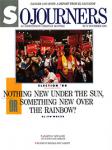Khotso House, located in the center of Johannesburg, South Africa, means "The House of Peace." I visited Khotso House last spring and found a building bustling with energy and activity. It was the headquarters of the South African Council of Churches (SACC), and it also housed the offices of human rights, trade union, and detainee support groups. Everyone in Khotso House was deeply engaged in the struggle against apartheid and for a new South Africa.
At approximately 1:10 a.m. on the morning of August 31, an expertly set bomb destroyed the House of Peace. No one was seriously injured, but the building was so structurally damaged that it may well be beyond repair. The bombing of the SACC offices was similar to other attacks on church, union, and other organizations that have challenged the white South African government. Just over a year ago, the Johannesburg headquarters of the Congress of South African Trade Unions (COSATU), the nation's largest labor federation, was destroyed in a very similar bombing attack. Six months ago in Cape Town, a bomb damaged Community House, which provided offices for a number of church and community groups. These bombings remain unsolved.
The most recent attack came shortly after the South African churches and prominent church leaders launched a new campaign of nonviolent direct action and civil disobedience aimed at the system of apartheid. In the political vacuum created by the silencing of most other groups, the churches have moved to the front lines of the freedom struggle in South Africa. The early-morning bombing appears to be an answer to the churches stepping forward.
Several days later, I spoke by phone with Frank Chikane, the general secretary of the SACC, who said, "This is connected to the witness and action of the churches." If the purpose of the bombing was to distract, disrupt, and make it much more difficult for the SACC to carry out its work, the attack had succeeded. But if the attack was meant to intimidate and turn back the churches from the risky path they have chosen, those who planted the bomb and those who gave them orders will be sorely disappointed. The church leaders are more determined than ever to fulfill their vocation and responsibilities to the people of South Africa.
"We are squatting now," said Chikane with irony. "We have joined the people!" SACC activities now go on from a variety of offices around Johannesburg where others have taken them in. In the mean-time, the police have closed the building and taken control of the SACC headquarters.
The council leaders and staff are not allowed in the building except when accompanied by the authorities and have been denied access to their own documents and files. Chikane said that things had disappeared from his office and witnesses had seen files being carried out of the building. SACC files include the names of thousands of people who receive critical assistance, like the families of political prisoners in South Africa's jails. At a news conference after the bomb blast, Chikane said, "We have no doubt that the darkest forces of evil are arranging themselves against the church in South Africa, but we intend to continue telling the truth."
WHEN I WAS A BOY in Sunday School, I was taught that a church is the people and not the building. The South African government is about to learn that same lesson. Last spring, church leaders such as Frank Chikane made it very clear to us that they understood the consequences of the commitments they had made.
Having long ago exhausted all of its moral resources, the only weapon the white South African government has left is violence. That is an indication not of its strength but of its weakness. Even when the South African Council of Churches has to hold its meetings in the street (as it did the morning of the bombing), it is stronger than the South African government. The day of freedom is certainly coming, but the price of freedom will be high. The South African churches have counted the cost and are asking for our help.
In the midst of the bad news, Chikane happily reported that the Sojourners special issue on South Africa had gotten through to them and that everyone was greatly encouraged. "Tell everyone how much we appreciate and need their support, especially now."
How about this for a start? If every Sojourners reader sent a letter to State President P.W. Botha condemning this violent attack against the church in South Africa and expressing support for the South African Council of Churches, the government would get 100,000 letters and maybe get the message. Perhaps your church, community, group, or even your family could also send a message of support to the South African Council of Churches. It would mean a lot to them.
I'd appreciate being sent copies, too.
Jim Wallis is editor-in-chief of Sojourners.

Got something to say about what you're reading? We value your feedback!
